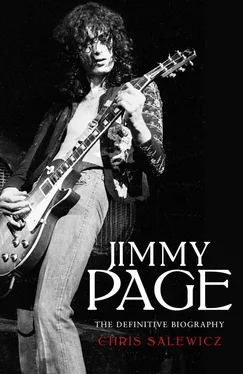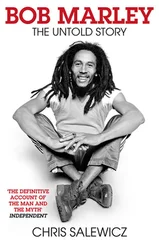On 18 June 1966 Page travelled up to Oxford in the passenger seat of Jeff Beck’s maroon Ford Zephyr Six to watch his friend play with Chris Dreja and the other Yardbirds at the May Ball at Queen’s College. They were on the same bill as seasoned Manchester hitmakers the Hollies. Not that that ‘seasoned hitmaker’ rubric couldn’t also have been applied to the Yardbirds. Since Beck had joined the band it seemed like they were never out of the UK charts – and increasingly the US hit lists were also welcoming the group’s 45s: ‘Heart Full of Soul’, ‘Evil Hearted You’, ‘Shapes of Things’ and ‘Over Under Sideways Down’ had all been hit singles. Meanwhile, their critically acclaimed Yardbirds album – more generally known as Roger the Engineer – was about to be released in the middle of July 1966.
Although events such as the May Ball paid well, they were formal, black-tie occasions, in the main quite uptight and, as defined in the new underground vocabulary, extremely ‘straight’. Becoming increasingly drunk as the evening progressed, Keith Relf, the Yardbirds’ singer, took exception to this prevalent social posture, and he began to harangue and berate his audience of bright young things. It was a stance that Page, notwithstanding his fondness for tropical fish, always a rebel and in tune with the more esoteric minutiae of pop culture, admired greatly: he thought Relf put on ‘a magnificent rock ’n’ roll performance’. Paul Samwell-Smith, the Yardbirds’ bass player, was so appalled by Relf’s stance, however, that as soon as their show was over he quit.
With further dates coming up, the Yardbirds were concerned about how they could play them without a bass player. On the spot, Page volunteered his services. ‘They had a show at the Marquee Club, and Paul was not coming back. So I foolishly said, “Yeah, I’ll play bass.” Jim McCarty says I was so desperate to get out of the studio that I’d have played drums.’
For some time Page had harboured doubts about whether he could continue working as a session player. ‘My session work was invaluable. At one point I was playing at least three sessions a day, six days a week. And I rarely ever knew in advance what I was going to be playing. But I learned things even on my worst sessions – and believe me, I played on some horrendous things. I finally called it quits after I started getting calls to do Muzak. I decided I couldn’t live that life any more; it was getting too silly.’
‘I remember the May Ball,’ said Beck. ‘Jimmy Page actually came to that gig. He came to see the band and I told him things were not running very smoothly. There were these hello-yah Princess Di types around. Trays with drinks with sticks. And as soon as we started Keith fell over back into Jim’s drums. After, I said, “Oh sorry, Jim, I suppose you’re not interested in joining the band?” He said it was the best thing ever when Keith fell back into the drums. It wasn’t going to put him off that easily.’
And so, slightly oddly, Jimmy Page joined the Yardbirds. That Marquee show took place three days later, on 21 June. How was Page’s performance? Terrible, according to Beck. ‘Absolute disaster. He couldn’t play the bass for toffee. He was running all over the neck. Four fat strings instead of six thin ones.’
Whatever. As soon as Page became a part of the group, he changed his look entirely: he presented himself as a highly stylised, very chic rock star, someone of ineffable good taste and class. And very quickly, with his characteristic diligence, he became adept on the bass guitar.
Before Page formally joined the Yardbirds, he went round to Simon Napier-Bell’s flat in Bressenden Place, near Buckingham Palace, for a meeting with the group and their manager. ‘When he arrived,’ said Napier-Bell, ‘he had an enormous swollen lip. Nobody knew who’d done it. He said some people had stopped him in the street and hit him. I remember thinking that if you’re Jimmy Page that could happen to you because of your sneering. Jimmy’s superciliousness was hard to take. When Jimmy Page looked as nice as he does, maybe he thought he could get away with it.
‘He came into the group. I said, “We don’t really get on.” “You’re my manager: I want to see the contract,” he said. I said, “You won’t. I’ll take my percentage off four-fifths of the money, and I won’t manage you.” Because I knew he would want to pull a stunt and say the contract was terrible.
‘I always thought Jimmy Page was partially gay. He didn’t have a great childhood: because he was such a cunt, you knew he didn’t have a great childhood. And later he got into transvestism. Which meant he thought he was straight.
‘I said to Jeff Beck, “Jimmy Page is coming in to the Yardbirds and you will leave.” He said, “No, I won’t.”’
Although ‘Jeffman’ had been proprietorially spray-painted onto the rear of the Telecaster Beck had gifted him, Page customised the instrument, giving it a psychedelic colour-wash, adding a silver plate to catch stage lighting and reflect it back at the audience, a simple but extraordinarily effective trick. For some time this Telecaster became identified with Page.
Yet before he could graduate to playing this guitar with the Yardbirds, Page remained the group’s bass player. It must have been a baptism of fire: vocalist Keith Relf, an asthmatic, would drink all day, the singer’s inner turmoil perhaps exacerbated by the fact that, oddly, the Yardbirds’ tour manager was his own father. Between the Marquee show and the end of July, the Yardbirds played 24 dates, all over the UK. For Page it must have been like getting back on the gruelling road with Neil Christian and the Crusaders. There was a show with the Small Faces in Paris on 27 June, and a set of dates in Scotland early in July; at one of these Beck and Page were spat at for wearing the German Iron Cross. Couldn’t these former art students have explained that they were simply indulging in a spot of street-level conceptual art? (Or perhaps it was an indication of chronic immaturity? A decade later comparable attempts at shock would be made by the likes of punk stars Sid Vicious and Siouxsie Sioux, similarly employing Nazi regalia. As with the Yardbirds’ efforts, wouldn’t you consider this to be comparable to naughty ten-year-olds drawing such images on their school exercise books?)
Although he had his flat off Holland Road in west London, Page was still frequently staying at his parents’ house in Epsom. But in the mid-sixties his parents separated and then divorced. This brought great pain to their son. Moreover, shockingly, his father had been living a double life: he had created a separate family with another woman. This would have been devastating news. ‘You would never trust anyone again, especially intimate people,’ commented Nanette Greenblatt, a renowned London life coach. ‘In any relationship you were in, you would be worrying, “This is okay for now, but how will it turn out?” Accordingly, you would want to control people. There would be a strong distrust of male figures. And Aleister Crowley would fit in nicely as an unreliable father figure.’
The kind of trauma to which Page and his mother were subjected by this egregious information about his father must have been almost overwhelming. But, just as a new birth is said to bring good luck, so a figurative death in the shape of divorce can sometimes offer the opportunity for a phoenix-like rise to escape the grief of the event. Something like that happened to Page. Some constraints fell away, to expose a desire for the ultimate promulgation of who he could be, and how far he could take it. You can have this fantasy image of yourself, which, if you work hard enough at it, is what you become. In other words, find your true will: who you are meant to be in this existence and what you are here for – the meaning of Crowley’s ‘Do what thou wilt’, appropriated almost predictably from a freemasonry text. Once upon a time, ‘Jimmy Page’ was a construct in Page’s own mind. But because he meant it, and, more importantly, needed it, it became him, and he it. With some assistance from his beliefs, of course.
Читать дальше












